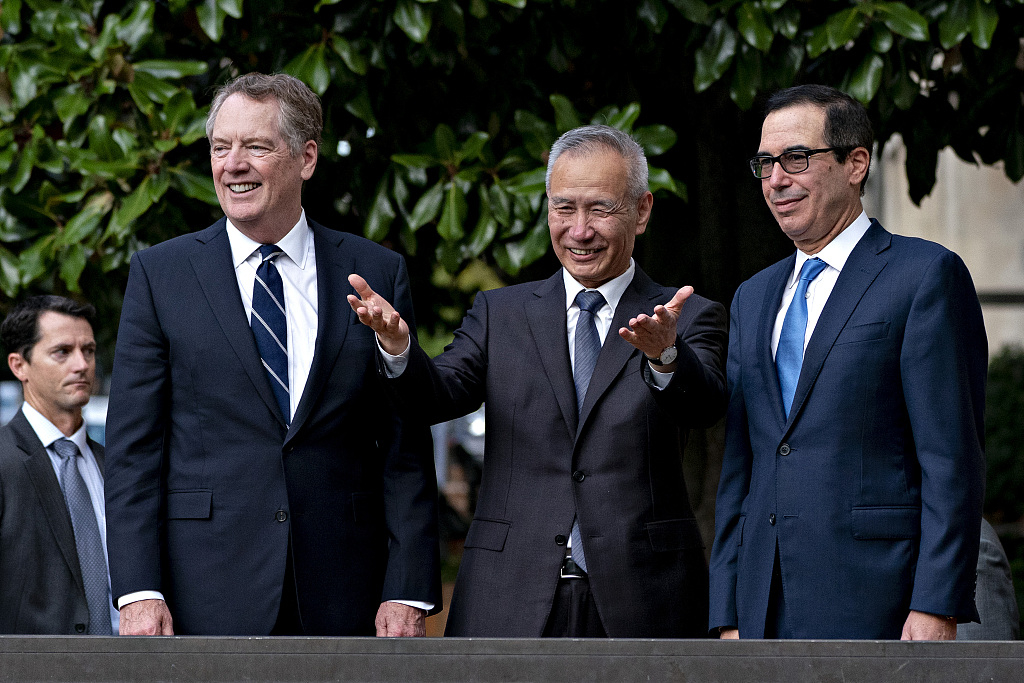
Editor's note: Sun Chenghao is an assistant research professor at the Institute of American Studies, China Institutes of Contemporary International Relations. The article reflects the author's opinions, and not necessarily the views of CGTN.
Apart from making groundless accusations against China on almost every old issue concerning trade, intellectual property rights, religions, the South China Sea, and even the recent NBA incident, the U.S. Vice President Mike Pence delivered a more balanced speech on China than that of last year, stating that despite great power competition is underway, the United States wants China to be better and would treat China based on mutual respect, consistency, and candor.
The timing of the speech shows that the U.S. hopes that the bilateral relationship between the two countries should not be derailed or deteriorated before the trade deal could possibly be signed at the upcoming APEC summit in Chile next month. However, the speech is more to serve political aims rather than offering a strategic roadmap for China-U.S. relations.
Pence also sent a very clear message that the Trump administration did not seek a"decoupling" from China and the U.S. seeks engagement with China and China's engagement with the wider world, but in a different way from the past administrations.
Needless to say, the U.S. still holds strong pride and prejudice about China's development and the China-U.S. relations. First, the U.S. believes that its policies on China in the past 40 years have failed because it did not transform China into a country as it had expected by solely engaging. Second, China's fast economic development should mainly be attributed to the huge investment of the United States. Third, China is undermining and challenging American hegemony in both regional and global arenas.
Currently, the two countries face another opportunity to recalibrate the relationship after they achieved substantial progress after holding a new round of high-level economic and trade consultations. Besides the details in bilateral relationship, the U.S. should understand the fundamental reason for the strategic turbulence is that there is no strategic framework or definition between the two countries after the U.S. named China as a "responsible stakeholder" during the Bush administration. Therefore, mutual trust between the two countries has been heavily reduced.

Liu He, China's vice premier, center, gestures towards members of the media while arriving for a meeting with Steven Mnuchin, U.S. Treasury secretary, right, and Robert Lighthizer, U.S. trade representative, at the Office of the U.S. Trade Representative in Washington, D.C., U.S., October 10, 2019. /VCG Photo
Liu He, China's vice premier, center, gestures towards members of the media while arriving for a meeting with Steven Mnuchin, U.S. Treasury secretary, right, and Robert Lighthizer, U.S. trade representative, at the Office of the U.S. Trade Representative in Washington, D.C., U.S., October 10, 2019. /VCG Photo
China could accept the concept of "great power competition" but the competition should be based on rules and must have bottom lines. Without a strategic framework, the Sino-U.S. competition could easily lead to confrontation, because China is neither the Soviet Union of the Cold War nor Japan of the 1980s and the U.S. has no experience in dealing with a rising China.
It is hard to establish a strategic framework overnight and the more feasible way is to build it step by step. The first step is to try to understand each other's thoughts and construct a basic confidence if mutual trust is difficult to achieve.
Therefore, it is now important for the two sides to make a prejudice-free overall review on each other's strategic intentions and global efforts. The U.S. should especially do more to prove its sincerity of resisting "decoupling" and treat China with mutual respect as Pence has stated in the speech.
The future renewed engagement with China should not be based on the illusion of transforming China and the U.S. should abandon its arrogance which claims that the U.S. has rebuilt China over the past four decades.
The next step is to draw red lines for each other since the paradigm of engagement has undergone transitions. For instance, the two countries should cherish people to people exchanges and avoid any negative spillover effects which could undermine the foundations of bilateral relations.
Last but not least, as Pence has mentioned in his speech the significance of cooperation, how to cooperate should also be identified and expanded to help manage the current challenges in the bilateral relationship and promote consistent engagement.
Both China and the U.S. should bear in mind that there are still many global issues, like setting global rules for AI, cyber security governance as well as global warming, that need urgent treatment. Therefore, mutual confidence and renewed engagement with each other is of significant importance currently.
(If you want to contribute and have specific expertise, please contact us at opinions@cgtn.com.)